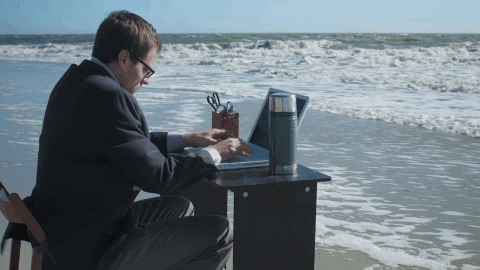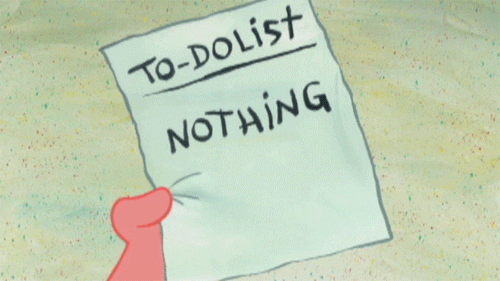When’s the last time you took a vacation from work? Like a real, unplugged vacation?
Not one where you’re hauling your laptop to the pool or not-so-subtly checking your emails while waiting in line for Disney FastPasses.
Has it been a while? Yeah, I thought so. I have news for you: a true vacation is actually really good for you—both mentally and physically.
Of course, one of the most obvious benefits is a reduction in your stress levels. But you don’t just feel more at ease when your autoresponder is on and you’re kicking your feet up. One study of 887 lawyers found that the stress-relieving effect of vacation extended for several weeks after their time off was over.
The upsides don’t end there. Taking a vacation has also been proven to boost productivity levels, increase on-the-job performance, combat exhaustion and burnout, it’s even linked to helping you live longer. Seriously, just Google “benefits of vacation” and you’ll notice that the list goes on and on.
Here’s the not-so-great news: Despite those upsides, we’re all pretty terrible at taking time off.
According to the U.S. Travel Association’s research, a reported 52% of employees in the United States said that they had unused vacation days at the end of 2017. Even scarier? That means employees forfeited 212 million vacation days in just one year.
Yikes! But it begs the question: If vacation is both enjoyable and good for us, why are we all still so terrible at removing ourselves from our desks and inboxes? Well, a lot of it comes back to a little something called “vacation guilt.”
What The Heck Is Vacation Guilt?
On a practical level, you know that there’s no denying the facts—vacations are good for you and you’ve earned that time off. Another round of mojitos, please!
But on an emotional level? Some of us can’t help but to beat ourselves up over the fact that we’re ditching our job duties for a few days of rest and relaxation. But why does this sense of remorse almost immediately creep in?
There are a couple of different factors at play here.
The first is the pervasive belief that time away from the office could potentially derail your career. According to research from software company, Kimble Applications, 14% of respondents believed that not using all of their vacation time increased their opportunities for advancement.
Despite the fact that more and more companies are moving to a results-based culture (that doesn’t care so much about the hours employees are spending in the office), many of today’s workers believe that vacations could sabotage their potential for promotions—and maybe even their entire careers. That likely explains why a whopping 56% of Americans still work while they’re on vacation.

Another key piece of vacation guilt involves your relationships with coworkers. We all know what it feels like to have to cover for a team member who’s away. It’s a lot of added stress and work, and that firsthand experience could make you hesitant to leave your colleagues holding the bag.
In fact, in Alamo Rent a Car’s 2019 Family Vacation Survey, 53% of workers say they feel guilty when taking time off because their coworkers are left to handle their job duties.
How to Banish Your Vacation Guilt (And Actually Enjoy Your Time Off)
In some ways, vacation guilt is a good sign—it means you’re a kind and conscientious worker who cares about your career growth and your team members.
But does that mean vacation guilt is inevitable?
Not exactly. Here are a few tactics you can put into play to get some peace of mind and actually enjoy the vacation you’ve earned.
1. Start Planning (Like, Super Early)
There’s a bit of irony involved in taking a vacation: the time off is intended to relax you, yet the preparation adds a lot more stress to your plate. One survey of over 1,000 U.S. adults found that the majority of respondents experienced increased stress from trying to complete extra work ahead of time.
That’s why it’s smart to start planning for your vacation well in advance—and we’re not talkin’ just a few days before you set off.
As soon as you have that vacation booked, block it off on your calendar not only so that people can’t schedule meetings or commitments during that time frame, but also so that it serves as a constant reminder as you’re planning your own deadlines and workload.
Next, make an effort to spread out any extra work so that you aren’t cramming it all in a couple of days before you leave. Exactly how early you start can vary depending on your typical tasks and how many vacation days you’re taking, but even giving yourself two weeks to work ahead will make your workload more manageable.
Finally, being conscious about planning your vacations for less busy times can also help to ease the mental burden you’re dealing with. You’ll have a much less painful time bidding your to-do list adieu when you know it’s a notoriously quiet period in the office—as opposed to a frantic crunch time.
2. Set The Perfect Autoresponder
You can blame technology for why it’s so hard to disconnect and take some real time off. We’re able to check in on our inboxes from anywhere—including on vacation. More than 62% of employees check their work-related email and voicemail while they’re away.
The siren song of your inbox will always be strong (and honestly, more power to you if you find it less stressful to check in here and there). However, you can get some much-needed peace of mind by setting the perfect autoresponder for your time off.

Personally, I’ll set an out-of-office message even if I’m taking a random day off here and there. I get a lot of reassurance in knowing that people are in the loop about my absence and aren’t expecting an immediate response.
Some people prefer to have lighthearted autoresponders while others need to stay strictly professional. But regardless of your tone, make sure you explain:
- Your expectations (i.e. are you checking in occasionally or are you totally out of touch?)
- The date people can expect a response (hey, this doesn’t necessarily have to be your actual return date if you want to give yourself some time to catch up!)
- Who people can get in touch with while you’re out, as well as their contact information (if applicable)
Here’s what my own typical out-of-office responder looks like (note that I’m a freelancer, so I don’t have a colleague to re-route messages to):
Hey there,
Thanks for your email! But spoiler alert: I’m not here.
That’s right—I’m spending a few days with my computer shut down and my toes in the sand. I hope I didn’t just make you too jealous.
Please be aware that I’m really making an effort to unplug and won’t be checking email during my time off. But have no fear! I’ll respond to your message when I return to my normal schedule on Monday, July 8.
Talk to you soon!
Kat
It gets the necessary points across while still being friendly and personable. Plus, the mere fact that this message aligns people’s expectations with my own reality gives me the confidence I need to step away from my inbox—for the most part.
3. Clearly Communicate Your Expectations
Speaking of expectations, that’s one of the most important pieces of taking a guilt-free vacation. You need to explicitly share your expectations for your time away with everyone you’re in regular contact with—including your boss, colleagues, and clients.
Will you be checking in here and there and still working occasionally? Or are you going totally off the grid? Can you be reached if something urgent comes up? If so, what’s the best way to get in touch? Are there certain tasks that you’d prefer your colleagues didn’t handle and instead save for your return?
Getting on the same page about these important things eliminates confusion and sets you (and not to mention your team members) up for some successful time away.
The day before you head out, send one final recap email to the relevant people reiterating these expectations and detailing any other need-to-know information for while you’re away (like things I’ve completed, pending items, and even advice for common situations).

Ready for a vacation hack? I actually have a template email saved in my Gmail canned responses that I can quickly edit with the relevant facts before heading out. It helps me ensure I hit all of those nuts and bolts (hello, vacation brain) and also saves me some time—which I’m notoriously short on when I’m about to take time off.
Try doing the same thing for yourself. You can thank me later.
4. Return The Favor
In order for you to make the most of your time off, you’ll require a little help. You need your team members to pick up some slack and avoid pinging you while you’re away. Undoubtedly, it’s going to require a little extra effort on their part.
More often than not, they’ll be more than happy to step up and help you out. But here’s the thing: you need to be willing to return the favor.
When other people on your team are preparing for some time off, follow the golden rule and treat them the way you want to be treated (who knew you learned everything you needed to know about being a solid coworker in kindergarten?).
Ask what you can take off their plate. Avoid messaging them or piling their desks full while they’re out. Do what you can to make the process as painless as possible for them.
Not only is it just the right thing to do, but you’ll also feel a whole lot less guilty when it’s time for you to take your own vacation—because you’ve contributed to a culture where time off is encouraged and supported, rather than reprimanded with seemingly endless piles of work.
So…How Much Time Off Should You Be Taking?
You know that time off is important, and you’ve emotionally prepared yourself for that time away from your work responsibilities. But uhh…exactly how much time off do you need to really reap the benefits?
Well, that depends.
Research published in the Journal of Happiness Studies suggests that feelings of relaxation peak at around the eighth day off—suggesting that you need a pretty lengthy vacation in order to truly recharge.
However, other research paints a slightly different picture. A study conducted at Erasmus University in Rotterdam found that it’s actually the anticipation of an upcoming vacation that increases feelings of happiness. As a result, the study’s leader concluded that taking at least two smaller breaks spread out throughout the year is better than one long, mega vacation.
So, there really isn’t one definite answer to the, “How much vacation is enough?” question.
Find what works for you—just make sure that you’re taking some time off (honestly, at the very least, two full work weeks) each and every year.
You’ve Earned Your Vacation (So Enjoy It!)
Especially in today’s world where people wear “busy” as a badge of honor and our packed schedules are what make us feel valued, it’s normal for your vacation to inspire a little guilt. You don’t want to sabotage your reputation or force your colleagues to pick up the slack.
But remember this: You’re entitled to your vacation days. That’s why they’re quite literally part of your benefits package.
The key is to stop viewing rest and relaxation as a waste of time, because trust me, it’s not. As study after study has proven, time off is actually a key ingredient for being a successful, productive, and most importantly, happy employee.
So go ahead and add this to your to-do list: book a vacation. Yes, a real one. You’ve earned it.










































